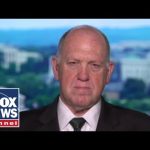In a recent podcast episode that sent shockwaves through the political world, Katie Couric aimed to draw controversial remarks from Senator John Fetterman regarding the late Charlie Kirk, founder of Turning Point USA. The exchange, which aired on Couric’s podcast, was an attempt, as many observers noted, to fish for a “gotcha moment” that would pit Fetterman against Kirk, especially in light of Kirk’s untimely and tragic assassination. Instead of walking into this trap, Fetterman took a surprising stance, focusing not on bashing Kirk but on emphasizing the need for respect, kindness, and understanding, particularly for Kirk’s grieving family.
During the dialogue, Fetterman addressed the dangers of extreme rhetoric and the escalating tensions that can lead to real-world violence. He expressed a clear position that while disagreements are inevitable in politics, they should not spiral into personal attacks, especially in a hyper-charged environment. His comments highlighted a crucial point: keeping discussions civil could help to cool down the political temperature that has risen in recent years. With an allusion to the dangerous consequences that can arise from heated exchanges, Fetterman proved adept at navigating the tricky waters that often accompany media interviews.
Katie Couric, on the other hand, seemed intent on focusing on the idea that Charlie Kirk’s rhetoric was responsible for the violence that ended his life. This angle seemed to backfire, as it painted Couric, and by extension the media, as hypocrisy-laden. Many viewers picked up on the feeling that her attempts were less about constructive conversation and more about inciting division. Some commentators raised their eyebrows at the notion that anyone’s free speech, even when deemed uncomfortable or extreme, could lead to a justification of violence against them.
The conversation drew contrasting views from fellow panelists on the Fox News show “Outnumbered.” While some expressed relief at Fetterman’s restraint and ability to promote reasonable discourse, others criticized Couric for amplifying incendiary rhetoric instead of fostering unity. A recurring theme was that, amidst a heated political climate, respectful communication is vital to maintaining civility. Panelists underscored the importance of recognizing that while free speech may incite discomfort, it shouldn’t warrant violence, a straightforward assertion that many in the audience heartily agreed with.
So, why does this matter? The incident speaks volumes about the state of political discourse in America. A call for mutual respect does not mean stifling one’s beliefs; it simply emphasizes the need to disagree without being disagreeable. With many American citizens yearning for authentic communication across party lines, Fetterman’s approach serves as a refreshing reminder that there’s room for differing opinions without resorting to hostility. If political figures can model this behavior, perhaps ordinary citizens will feel empowered to follow suit.
In this day and age, where every headline seems to stoke division, it’s refreshing to see a prominent figure like Senator Fetterman advocate for decency amidst chaos. His stance challenged the narrative that politics must always be a battleground—a welcome perspective in a society that can often feel like it’s only interested in loud voices and contentious clashes. If only more public figures would embrace empathy—and yes, a little civility—the political landscape might just see a positive transformation.




